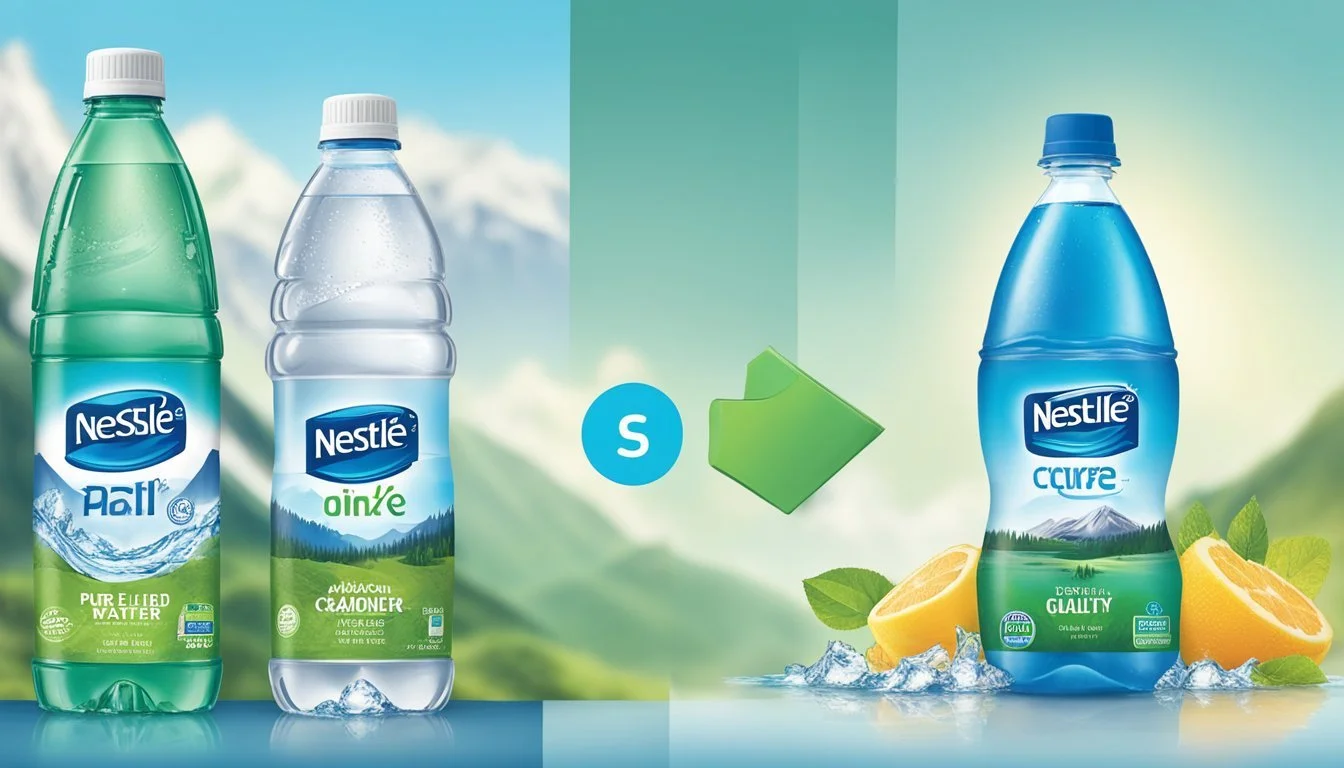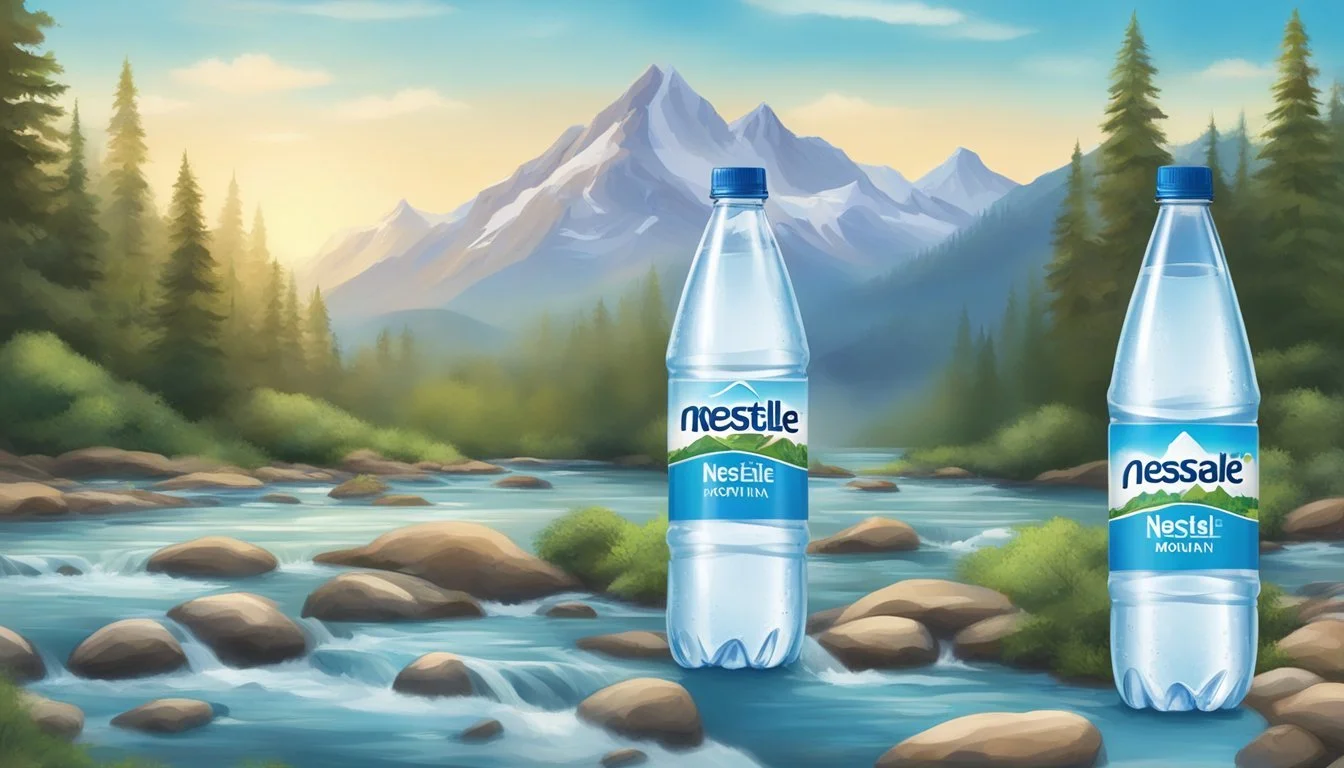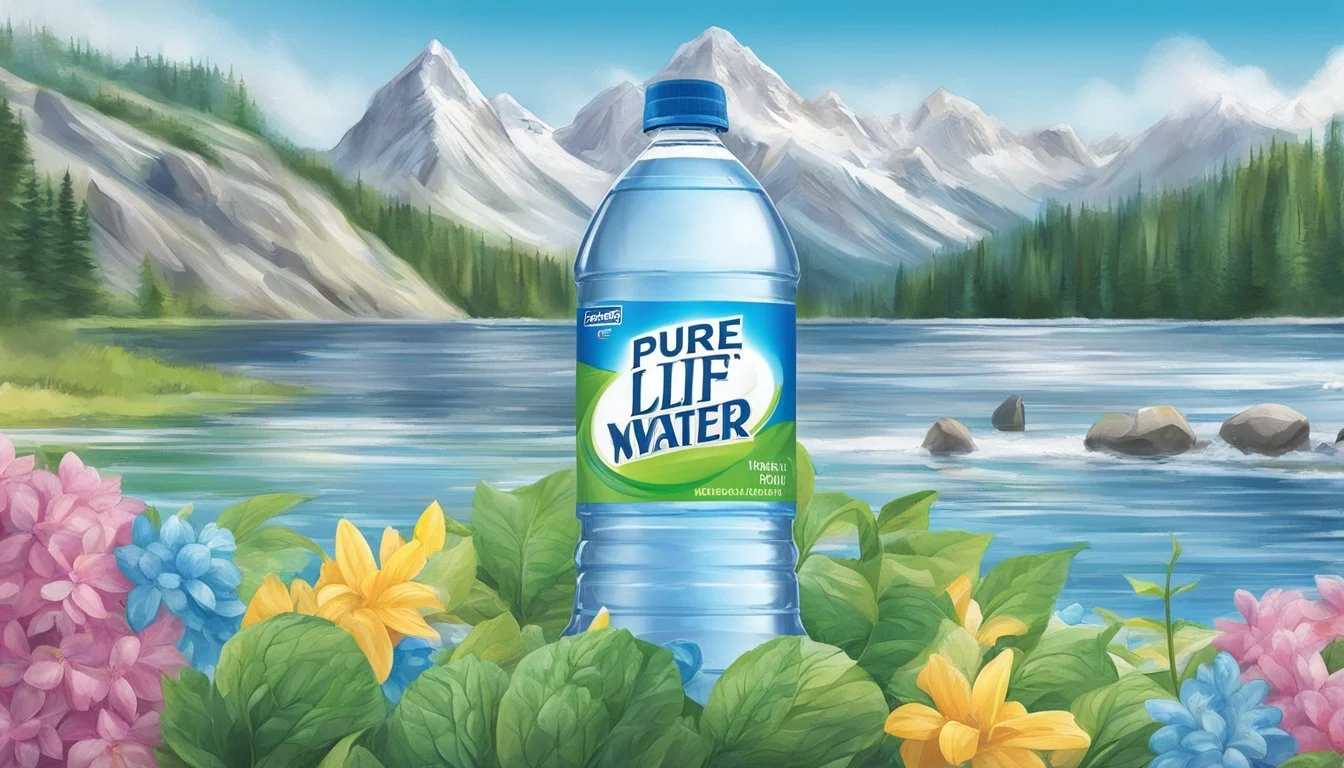Nestlé Pure Life vs. Cascade Mountain
Top Bottled Water Comparison
Choosing the right bottled water can make all the difference in your hydration habits, and two of the most prominent brands on the market today are Nestlé Pure Life and Cascade Mountain. Known for its affordability and global reach, Nestlé Pure Life offers a reliable, accessible option for everyday hydration. Conversely, Cascade Mountain positions itself as a premium choice, often marketed as natural spring water that promises a crisp, refreshing taste.
While Nestlé Pure Life is renowned for its widespread availability and budget-friendly pricing, it has garnered mixed reviews regarding its taste and source credibility. Cascade Mountain, on the other hand, prides itself on quality, often sourced from protected natural springs that appeal to consumers looking for a more pristine hydration experience.
When it comes to choosing between Nestlé Pure Life and Cascade Mountain, the decision often boils down to what you prioritize in bottled water—affordable convenience versus perceived quality. Understanding the nuances of each brand can help you make a more informed decision, ensuring your hydration needs are met both practically and enjoyably.
Origin and Source Comparison
Understanding the origin and water source of bottled water brands can greatly influence a consumer's choice. The details of where Nestlé Pure Life and Cascade Mountain source their water provide insight into quality, taste, and purity.
Nestlé Pure Life Water Source
Nestlé Pure Life sources its water from a variety of locations, primarily municipal tap water sources that undergo extensive purification processes. The water typically comes from aquifers and groundwater from different regions. This approach allows Nestlé Pure Life to market itself as an affordable and accessible water option. Their purification process includes steps like reverse osmosis, de-ionization, and micro-filtration to ensure the water meets high safety standards.
Cascade Mountain Natural Spring Water
Cascade Mountain sources its water from natural underground springs in the pristine mountain regions. The water is collected from a natural aquifer high in the Cascade Mountains, which is known for its mineral-rich composition. This natural spring water requires minimal processing, preserving its natural taste and mineral content. The source’s elevated location ensures that the water is filtered naturally through layers of volcanic rock, which enhances its purity. This method ensures high-quality, clean water that retains its natural characteristics.
Quality and Filtration Methods
Both Nestlé Pure Life and Cascade Mountain prioritize stringent filtration methods to ensure high-quality bottled water, meeting or exceeding EPA and FDA regulations. They also implement eco-friendly measures in their processes.
Filtration Process of Nestlé Pure Life
Nestlé Pure Life utilizes a multi-stage filtration process to maintain water purity. The water undergoes reverse osmosis, which effectively removes contaminants such as heavy metals and chemicals.
Two primary stages include carbon filtration and micro-filtration. Carbon filtration eliminates chlorine and certain organic compounds. Micro-filtration further removes fine particles and bacteria.
Nestlé maintains rigorous quality checks at every stage. This ensures compliance with EPA and FDA regulations.
Purified water from Nestlé Pure Life is not only free from harmful substances but also free from unpleasant tastes and odors.
Purity of Cascade Mountain Spring Water
Cascade Mountain sources its water from protected mountain springs, emphasizing natural purity.
The water undergoes a minimal filtration process to retain its mineral balance, primarily utilizing natural sediment filtration and UV light treatment. These methods effectively maintain the water's purity without altering its natural taste.
Due to the protected source, Cascade Mountain water contains fewer contaminants to begin with. Regular quality testing ensures it meets stringent EPA and FDA standards.
Its eco-friendly practices include sustainable water sourcing and recyclable packaging.
Cascade Mountain aims to offer premium spring water while maintaining environmental responsibility.
Chemical Composition and Health Benefits
Nestlé Pure Life and Cascade Mountain bottled water brands provide essential minerals and electrolytes, which are crucial for maintaining good health. These elements influence the water's overall benefit to the body, including its pH levels and mineral content.
Minerals and Electrolytes Content
Nestlé Pure Life is known to contain essential minerals and electrolytes, including calcium, magnesium, and potassium. Calcium is vital for bone health, while magnesium supports muscle function and nervous system health. Potassium helps regulate fluid balance and nerve signals. This combination makes it a beneficial choice for those seeking a balanced mineral intake in their hydration routine.
Cascade Mountain also offers a healthy dose of minerals. The brand often markets its spring water as a natural source of calcium and magnesium, with these minerals naturally present due to the water's source. This mineral profile helps meet daily nutritional requirements and supports overall health. The slight presence of these elements can positively impact bodily functions.
Comparing pH Levels
Nestlé Pure Life typically has a neutral pH level around 7. This pH level indicates that the water is neither acidic nor alkaline, making it a suitable choice for anyone looking to maintain a balanced intake of water that does not disrupt their body's natural pH balance.
Cascade Mountain water, on the other hand, often markets itself as possessing slightly alkaline properties, with a pH level ranging from 7.5 to 8.5. Alkaline water is believed to neutralize acid in the body, which could potentially help reduce acidity and improve overall hydration. People who prefer alkaline water may find Cascade Mountain to be more in line with their preferences.
Taste Profile
The taste profile of bottled water can significantly influence consumer preference. This section examines the flavor characteristics, mineral content, and overall water taste of Nestlé Pure Life and Cascade Mountain.
Flavor Characteristics of Nestlé Pure Life
Nestlé Pure Life is known for its neutral taste, which many attribute to its purification process. This involves multiple stages of filtration, including reverse osmosis, designed to remove impurities and any potential aftertaste.
Mineral Content:
Calcium: Minimal
Magnesium: Minimal
Sodium: Slight presence
This lack of minerals contributes to its clean, almost flavorless taste. Some describe it as refreshing yet plain, making it a versatile choice for everyday hydration.
Water Taste:
Due to its purification, Nestlé Pure Life often lacks the distinctive flavors found in mineral-rich waters. This makes it ideal for those seeking pure hydration without any overt taste.
Cascade Mountain Water Taste Evaluation
Cascade Mountain water is often praised for its crisp and refreshing flavor. Sourced from natural springs, it retains a higher mineral content, which contributes to its unique taste.
Mineral Content:
Calcium: Moderate level
Magnesium: Noticeable but balanced
Sodium: Low to moderate
These minerals impart a slight sweetness and a fuller mouthfeel compared to other bottled waters.
Water Taste:
Cascade Mountain water’s taste can be described as invigorating and pure, with subtle mineral notes that enhance the overall drinking experience. The natural minerals provide a slight yet pleasant aftertaste, appealing to those who prefer water with character.
Environmental Impact and Sustainability
Nestlé Pure Life and Cascade Mountain have varying approaches to sustainability, particularly in how they address packaging waste and the effects of water sourcing on ecosystems.
Packaging and Waste
Nestlé Pure Life primarily uses PET plastic bottles, which are theoretically recyclable. Despite efforts by Nestlé to promote recycling, a significant portion of these bottles still end up in landfills due to inefficiencies in waste management systems.
Cascade Mountain, on the other hand, emphasizes eco-friendly packaging. They use reusable glass bottles and some variants come in boxed water options. While glass bottles require more energy to produce and transport, they are recyclable and reusable, offering a potential reduction in long-term waste.
Water Sourcing and Ecosystems
Nestlé Pure Life sources its water from various locations, often utilizing public water supplies. Studies have shown that a substantial percentage of bottled water is essentially treated tap water. This practice can strain local resources and ecosystems, as evidenced by various environmental concerns raised by communities.
Cascade Mountain sources its water from natural springs, impacting the ecosystems surrounding their springs. Responsible water sourcing practices are vital to ensure that natural springs and surrounding habitats are not depleted or damaged. However, reliance on natural sources can also lead to over-extraction if not managed sustainably.
Comparison with Other Brands
Nestlé Pure Life and Cascade Mountain both occupy unique positions in the bottled water market. They face competition from a variety of other well-known brands, each with its own unique characteristics and consumer base.
Market Position of Nestlé and Cascade
Nestlé Pure Life is one of the most widely recognized bottled water brands globally. It is marketed as an affordable choice, appealing to a broad audience. Cascade Mountain, although less well-known, positions itself as a premium option. It often emphasizes natural spring sources and quality.
In terms of sales, Nestlé Pure Life outpaces Cascade Mountain due to its aggressive marketing and global reach. Cascade Mountain competes in a niche market where quality and origin matter more than quantity.
Nestlé Pure Life and Cascade Against Competitors
Nestlé Pure Life competes with Aquafina, Dasani, and Poland Spring. These brands are known for their widespread availability and lower price points. Dasani and Aquafina, both backed by Coca-Cola and PepsiCo respectively, are particularly formidable due to their extensive distribution networks.
Cascade Mountain often aligns with premium brands like Evian, Fiji, and VOSS that emphasize origin and purity. Fiji's natural artesian water and Evian's French Alps source highlight their premium status. VOSS and Icelandic Glacial also focus on superior taste and purity, creating stiff competition in the higher-end market.
While Nestlé Pure Life appeals to budget-conscious consumers, Cascade Mountain attracts those seeking quality and purity. The diversified strategies allow both brands to carve out their unique segments in a crowded market.
Safety and Regulations
The safety and regulatory compliance of bottled water is crucial to ensuring consumers receive clean and safe drinking options. Here, we will examine how Nestlé Pure Life and Cascade Mountain meet drinkable standards and adhere to necessary regulations and certifications.
Ensuring Drinkable Standards
Both Nestlé Pure Life and Cascade Mountain follow stringent standards to ensure their bottled water is safe for consumption. Nestlé Pure Life undergoes multiple purification processes including filtration, reverse osmosis, and UV treatment. This multi-stage purification helps eliminate contaminants such as lead, arsenic, and pfas chemicals.
Cascade Mountain, likewise, ensures its water is purified and free from harmful substances. The brand also regularly tests for the presence of heavy metals and ensures the absence of BPA (bisphenol A) from their bottles. These measures help in maintaining high drinkable standards and securing consumer trust.
Regulatory Compliance and Certifications
Nestlé Pure Life adheres to the regulations set by the FDA and EPA for bottled water. The company also holds various certifications for quality and safety, ensuring compliance with national standards. This includes regular testing and quality checks to maintain consistency.
Cascade Mountain also follows FDA and EPA guidelines and has earned several certifications for its compliance. Continuous monitoring and independent audits ensure that Cascade Mountain meets all required safety protocols, providing a reliable and safe option for consumers.
Table of Key Certifications:
Certification Nestlé Pure Life Cascade Mountain FDA Compliance ✅ ✅ EPA Standards ✅ ✅ BPA-Free Certification ✅ ✅ Independent Quality Audits ✅ ✅
Both brands' commitment to meeting and exceeding regulations guarantees consumers access to safe drinking water.
Packaging and Access
Both Nestlé Pure Life and Cascade Mountain offer distinct packaging options and different levels of market availability. This section explores how each brand approaches bottle materials and design, as well as their distribution.
Material and Design of Bottles
Nestlé Pure Life primarily uses plastic bottles for its products. These bottles are designed to be lightweight and convenient for everyday use. Some varieties may also come in large multipacks. While not typically eco-friendly, Nestlé Pure Life bottles are BPA-free, addressing some health concerns.
Cascade Mountain, contrastingly, often utilizes glass bottles, which are considered more eco-friendly. Their glass bottles have a premium feel and can be easily recycled. Cascade Mountain may also offer some products in boxed water packaging, catering to environmentally conscious consumers. Both brands steer clear of carbonated water in their standard offerings, focusing instead on still water.
Availability and Distribution
Nestlé Pure Life enjoys widespread availability, being one of the most commonly found bottled waters globally. It is sold in a variety of retailers, from large supermarket chains to local convenience stores. This extensive distribution network makes it very easy for consumers to purchase.
Cascade Mountain, however, is typically sold through select retailers and often in specialized stores that cater to premium products. Their distribution is not as extensive as Nestlé Pure Life’s, which can limit accessibility. Despite this, some consumers seek out Cascade Mountain specifically for its high-quality packaging and eco-friendly options.
Nestlé Pure Life's commitment to accessibility contrasts with Cascade Mountain’s focus on premium, eco-conscious packaging, making choice dependent on consumer priorities.
Final Assessment and Recommendations
Nestlé Pure Life and Cascade Mountain offer distinct experiences within the bottled water market.
Taste: Nestlé Pure Life has a clean taste, making it a popular choice for many consumers. Cascade Mountain, sourced from natural springs, has a crisp and refreshing flavor.
Hydration: Both brands effectively aid in hydration. The choice depends on personal taste preferences.
pH Level: Nestlé Pure Life usually has a neutral pH level around 7.0. Cascade Mountain often boasts a slightly alkaline pH level, appealing to those seeking mineral water.
Sustainability:
Nestlé Pure Life: Emphasizes reducing plastics with lighter bottles and increasing recycling.
Cascade Mountain: Focuses on eco-friendly practices, including minimal environmental impact during sourcing.
Energy: Both brands invest in sustainable practices to lower energy consumption during production and distribution.
Summary Table
Attribute Nestlé Pure Life Cascade Mountain Taste Clean Crisp and Refreshing Hydration Effective Effective pH Level Neutral Slightly Alkaline Sustainability Focus on Recycling Eco-friendly Sourcing Energy Usage Reduced Consumption Minimal Impact
Recommendations:
For a clean, straightforward taste and reliable hydration, Nestlé Pure Life is a solid choice.
For a slightly alkaline water with a refreshing taste and strong eco-friendly practices, Cascade Mountain stands out.
Consumers should consider taste, sustainability, and personal health preferences when choosing between these two brands.
More About Nestlé Pure Life
Acqua Panna vs Nestle Pure Life: Which Bottled Water is Better?
Aquafina vs Nestle Pure Life: Which Bottled Water is Better?
Arrowhead vs Nestle Pure Life: Which Bottled Water is Better?
Boxed Water vs Nestle Pure Life: Which Bottled Water is Better?
Core Hydration vs Nestle Pure Life: Which Bottled Water is Better?
Deer Park vs Nestle Pure Life: Which Bottled Water is Better?
Essentia vs Nestle Pure Life: Which Bottled Water is Better?
Ice Mountain vs Nestle Pure Life: Which Bottled Water is Better?
Icelandic Glacial vs Nestle Pure Life: Which Bottled Water is Better?
Just Water vs Nestle Pure Life: Which Bottled Water is Better?
Mountain Valley Spring Water vs Nestle Pure Life: Which Bottled Water is Better?
Nestle Pure Life vs 1907water: Which Bottled Water is Better?
Nestle Pure Life vs 7-Select: Which Bottled Water is Better?
Nestle Pure Life vs Alkaline88: Which Bottled Water is Better?
Nestle Pure Life vs Antipodes: Which Bottled Water is Better?
Nestle Pure Life vs Aqua Carpatica: Which Bottled Water is Better?
Nestle Pure Life vs Big Chill: Which Bottled Water is Better?
Nestle Pure Life vs BodyArmor: Which Bottled Water is Better?
Nestle Pure Life vs Castle Rock: Which Bottled Water is Better?
Nestle Pure Life vs CBD Living: Which Bottled Water is Better?
Nestle Pure Life vs Crystal Geyser: Which Bottled Water is Better?
Nestle Pure Life vs Crystal Lake: Which Bottled Water is Better?
Nestle Pure Life vs Essence pH10: Which Bottled Water is Better?
Nestle Pure Life vs Hawaii Volcanic: Which Bottled Water is Better?
Nestle Pure Life vs Hawaiian Springs: Which Bottled Water is Better?
Nestle Pure Life vs Kirkland Signature: Which Bottled Water is Better?
Nestle Pure Life vs Liquid Death: Which Bottled Water is Better?
Nestle Pure Life vs Mananalu: Which Bottled Water is Better?
Nestle Pure Life vs Open Water: Which Bottled Water is Better?
Nestle Pure Life vs Poland Spring: Which Bottled Water is Better?
Nestle Pure Life vs Proud Source: Which Bottled Water is Better?
Nestle Pure Life vs Pure Life: Which Bottled Water is Better?
Nestle Pure Life vs Purely Sedona: Which Bottled Water is Better?
Nestle Pure Life vs Refreshe: Which Bottled Water is Better?
Nestle Pure Life vs Richard's Rainwater: Which Bottled Water is Better?
Nestle Pure Life vs San Pellegrino: Which Bottled Water is Better?
Nestle Pure Life vs Simple Truth: Which Bottled Water is Better?
Nestle Pure Life vs Smartwater: Which Bottled Water is Better?
Nestle Pure Life vs Solan de Cabras: Which Bottled Water is Better?
Nestle Pure Life vs Talking Rain AQA: Which Bottled Water is Better?
Nestle Pure Life vs The Well: Which Bottled Water is Better?
Nestle Pure Life vs Topo Chico: Which Bottled Water is Better?
Nestle Pure Life vs Tru Alka: Which Bottled Water is Better?
Nestle Pure Life vs Weird Water: Which Bottled Water is Better?
Nestle Pure Life vs Whole Foods 365: Which Bottled Water is Better?
Nestle Pure Life vs Whole Foods Italian Still Mineral water: Which Bottled Water is Better?
Nestle Pure Life vs Zephyrhills: Which Bottled Water is Better?
More About Cascade Mountain
Acqua Pana vs Cascade Mountain: Which Bottled Water is Better?
Antipodes vs Cascade Mountain: Which Bottled Water is Better?
Aqua Carpatica vs Cascade Mountain: Which Bottled Water is Better?
Aquafina vs Cascade Mountain: Which Bottled Water is Better?
Arrowhead vs Cascade Mountain: Which Bottled Water is Better?
Boxed Water vs Cascade Mountain: Which Bottled Water is Better?
Cascade Mountain vs 1907water: Which Bottled Water is Better?
Cascade Mountain vs 7-Select: Which Bottled Water is Better?
Cascade Mountain vs Alkaline88: Which Bottled Water is Better?
Cascade Mountain vs Big Chill: Which Bottled Water is Better?
Cascade Mountain vs BodyArmor: Which Bottled Water is Better?
Cascade Mountain vs CBD Living: Which Bottled Water is Better?
Cascade Mountain vs Crystal Geyser: Which Bottled Water is Better?
Cascade Mountain vs Crystal Lake: Which Bottled Water is Better?
Cascade Mountain vs Essence pH10: Which Bottled Water is Better?
Cascade Mountain vs Kirkland Signature: Which Bottled Water is Better?
Cascade Mountain vs Open Water: Which Bottled Water is Better?
Cascade Mountain vs Proud Source: Which Bottled Water is Better?
Cascade Mountain vs Pure Life: Which Bottled Water is Better?
Cascade Mountain vs Refreshe: Which Bottled Water is Better?
Cascade Mountain vs Richard's Rainwater: Which Bottled Water is Better?
Cascade Mountain vs Simple Truth: Which Bottled Water is Better?
Cascade Mountain vs Talking Rain AQA: Which Bottled Water is Better?
Cascade Mountain vs The Well: Which Bottled Water is Better?
Cascade Mountain vs Weird Water: Which Bottled Water is Better?
Cascade Mountain vs Whole Foods 365: Which Bottled Water is Better?
Castle Rock vs Cascade Mountain: Which Bottled Water is Better?
Core Hydration vs Cascade Mountain: Which Bottled Water is Better?
Deer Park vs Cascade Mountain: Which Bottled Water is Better?
Essentia vs Cascade Mountain: Which Bottled Water is Better?
Hawaii Volcanic vs Cascade Mountain: Which Bottled Water is Better?
Hawaiian Springs vs Cascade Mountain: Which Bottled Water is Better?
Ice Mountain vs Cascade Mountain: Which Bottled Water is Better?
Icelandic Glacial vs Cascade Mountain: Which Bottled Water is Better?
Just Water vs Cascade Mountain: Which Bottled Water is Better?
Liquid Death vs Cascade Mountain: Which Bottled Water is Better?
Mananalu vs Cascade Mountain: Which Bottled Water is Better?
Mountain Valley Spring Water vs Cascade Mountain: Which Bottled Water is Better?
Poland Spring vs Cascade Mountain: Which Bottled Water is Better?
Purely Sedona vs Cascade Mountain: Which Bottled Water is Better?
San Pellegrino vs Cascade Mountain: Which Bottled Water is Better?
Smartwater vs Cascade Mountain: Which Bottled Water is Better?
Solan de Cabras vs Cascade Mountain: Which Bottled Water is Better?
Topo Chico vs Cascade Mountain: Which Bottled Water is Better?
Tru Alka vs Cascade Mountain: Which Bottled Water is Better?
Whole Foods Italian Still Mineral water vs Cascade Mountain: Which Bottled Water is Better?
Zephyrhills vs Cascade Mountain: Which Bottled Water is Better?









